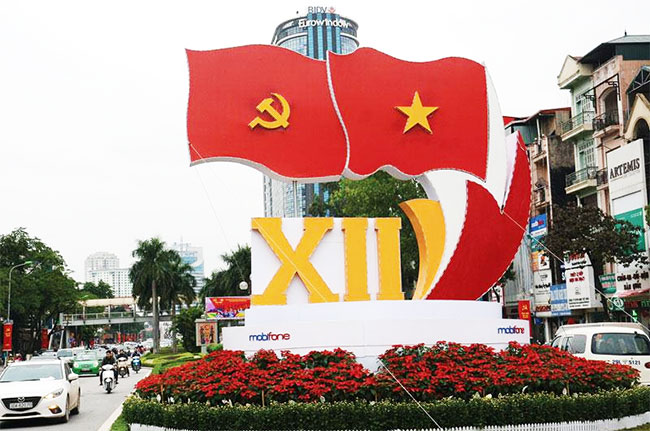Curtains rise on 12th National Party Congress

Promoting the strength of the populace and the socialist democracy, stepping up reforms comprehensively and synchronously, firmly safeguarding the nation and maintaining a peaceful and stable environment, as well as striving to soon turn Vietnam into a modern industrialised country are among the themes of the Congress, which takes place every five years.
According to the Congress’ organising board, the 8-day event during January 20-28, will focus on reviewing the implementation of the 11th Congress’s Resolution, and the outcomes of the 30-year reform process. Vietnam’s doi moi policy was a milestone of the sixth National Party Congress in December 1986, which outlined the comprehensive reforms focusing on economic policy and maintaining political stability to ensure the success of the renovation process.
The delegates will also discuss and approve several important documents, including the 11th Party Central Committee’s Political Report, a report reviewing the implementation of socioeconomic development tasks during 2011-2015 and putting forth directions and tasks for 2016-2020, and also a report reviewing the leadership of the 11th Party Central Committee.
Particularly, a new leadership board for the Communist Party of Vietnam’s Central Committee, Party General Secretary, President and National Assembly Chairman will be announced on January 28. The new Party Central Committee is expected to consist of 180 official members and 20 alternate members, as was said by Vice Chairman of the Party Central Committee’s Commission on Organisation Mai Van Chinh, who is also a member of the Party Central Committee.
The 12th National Party Congress will gather 1,510 delegates who represent more than 4.5 million Party members nationwide. 650 domestic and more than 100 foreign reporters have registered to cover the 12th Vietnam Party Congress, according to the organising board.
The Draft Documents of the 12th National Party Congress were open for public comments in September 2015. Since then, there have been 26 million comments. The new points of the drafts highlight the promotion of the strength of Vietnamese people, with the themes of this congress aiming at promoting socialist democracy, firmly safeguarding the nation, and maintaining a peaceful and stable environment.
The draft documents also stress a determination to achieve the goal of turning Vietnam into a modern industrialised country, but leaving open the exact time for Vietnam to achieve this goal. Previous Congresses set 2020 as the year for Vietnam to become an industrialised and modernised nation.
In terms of economy, the 12th Congress’ Draft Documents underlined the need to actively renew the growth model, strengthen institutions, develop a socialist-oriented market economy, and continue improving Party consciousness in the economy. According to the draft Socio-Economic Development Plan during 2016-2020, Vietnam will strive for an annual gross domestic product (GDP) growth of 6.5-7 per cent per annum and GDP per capita will reach $3,200-$3,500 by 2020.
In the fields of socio-culture and environment, the draft documents focus on issues related to the basic and comprehensive renovation of education and training, human resources development, science and technology application, cultural development, and social management, as well as the realisation of social progress, equality, and security.
Draft documents also affirm the importance of defence and national security and will examine new points and solutions in protecting the nation, building the people’s army and police forces, and synchronously implementing an independent and self-reliant foreign policy.
With regards to the building of the Party and the political system, the draft documents highlight the importance of “strongly promoting all resources and creativeness of people” and “respecting differences which do not go against the nation’s common interests”.
What the stars mean:
★ Poor ★ ★ Promising ★★★ Good ★★★★ Very good ★★★★★ Exceptional
Latest News
More News
- EU and Vietnam elevate relations to a comprehensive strategic partnership (January 29, 2026 | 15:22)
- Vietnam to lead trade growth in ASEAN (January 29, 2026 | 15:08)
- Japanese business outlook in Vietnam turns more optimistic (January 28, 2026 | 09:54)
- Foreign leaders extend congratulations to Party General Secretary To Lam (January 25, 2026 | 10:01)
- 14th National Party Congress wraps up with success (January 25, 2026 | 09:49)
- Congratulations from VFF Central Committee's int’l partners to 14th National Party Congress (January 25, 2026 | 09:46)
- 14th Party Central Committee unanimously elects To Lam as General Secretary (January 23, 2026 | 16:22)
- Worldwide congratulations underscore confidence in Vietnam’s 14th Party Congress (January 23, 2026 | 09:02)
- Political parties, organisations, int’l friends send congratulations to 14th National Party Congress (January 22, 2026 | 09:33)
- Press release on second working day of 14th National Party Congress (January 22, 2026 | 09:19)
















 Mobile Version
Mobile Version